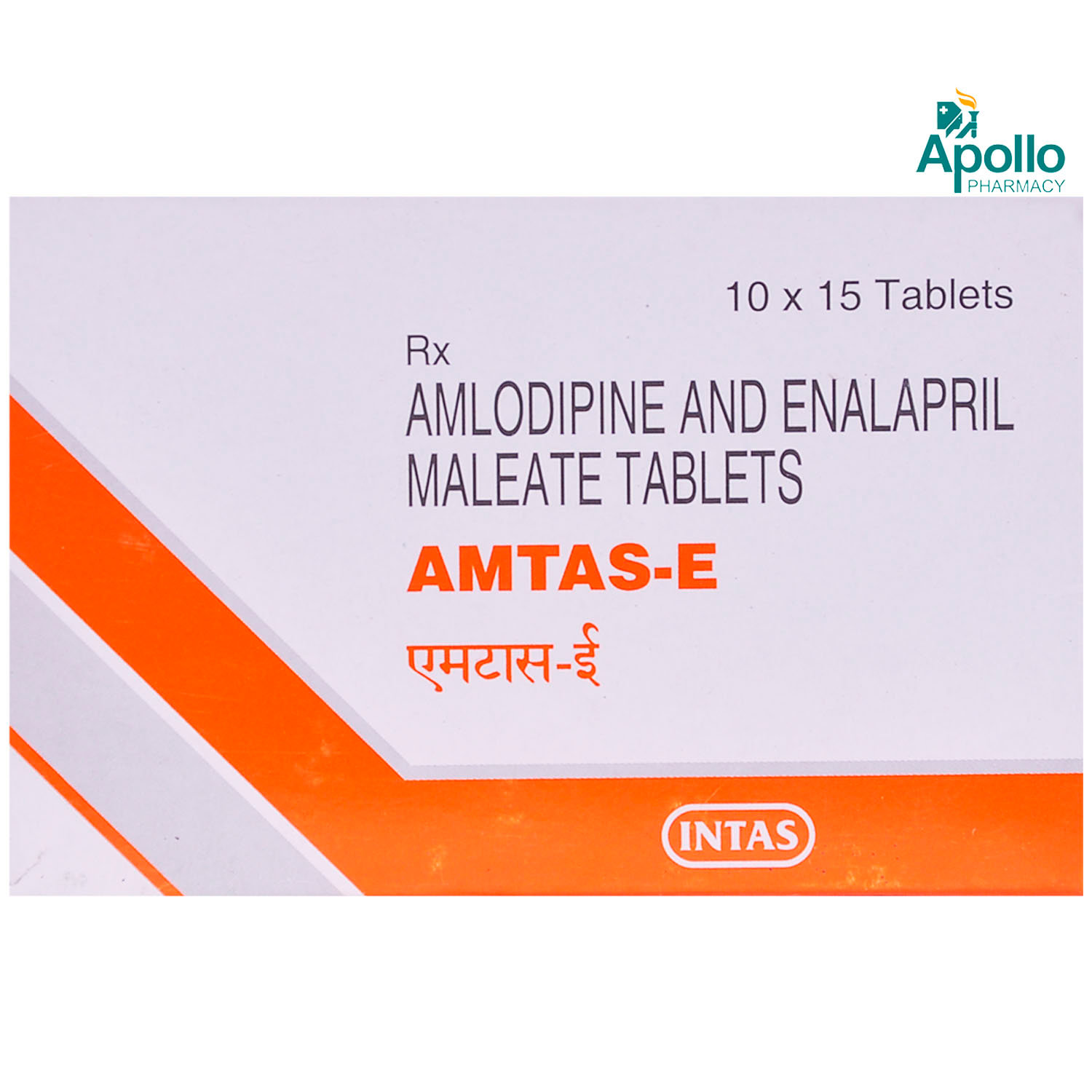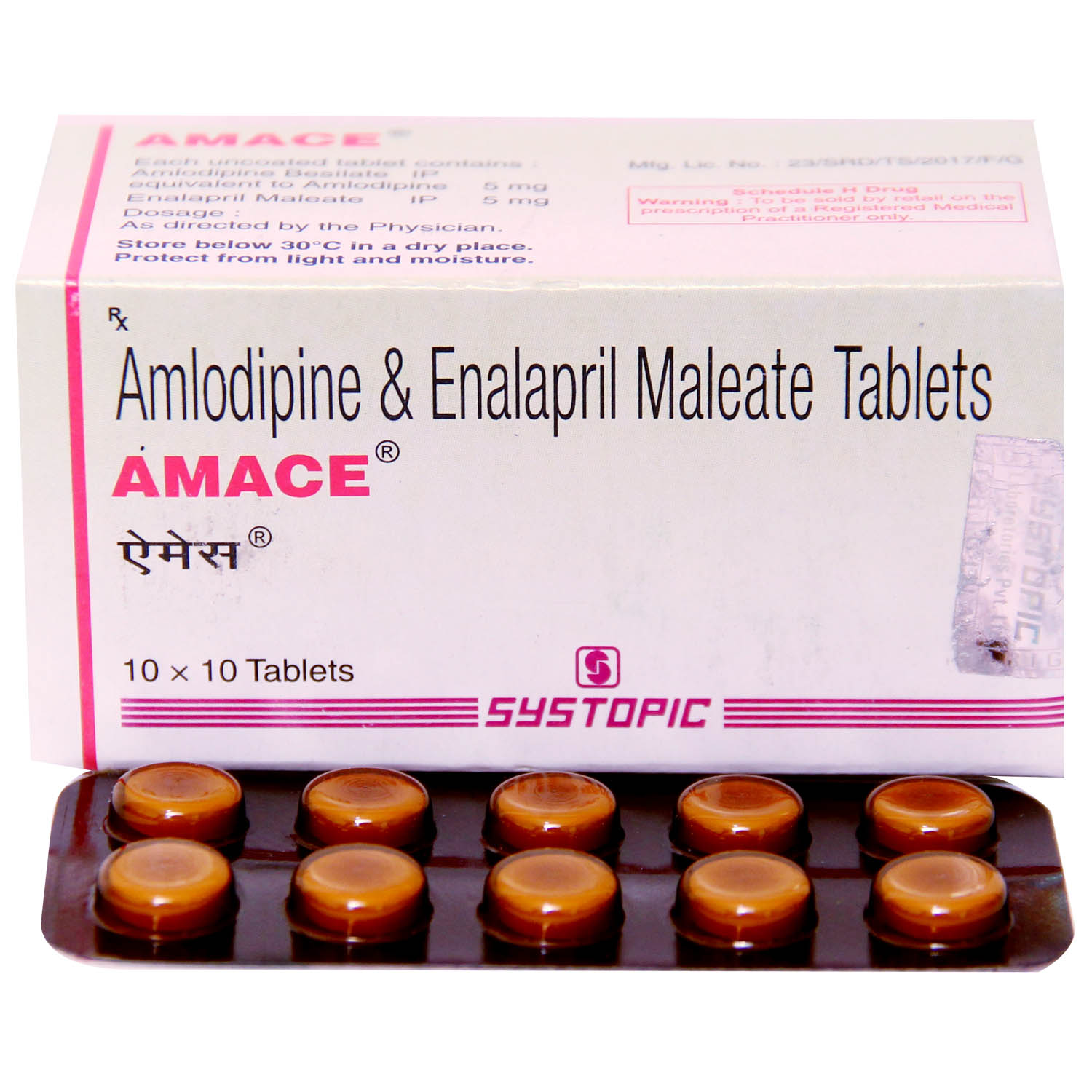Amlodipine+enalapril
About Amlodipine+enalapril
Amlodipine+enalapril belongs to the class of 'anti-hypertensive drugs' primarily used to treat hypertension (high blood pressure). Hypertension is a medical condition in which the blood exerts high pressure (force exerted by circulating blood) against the blood vessel's walls. This condition makes the heart work harder in pumping blood to the whole body. Hypertension can cause severe health complications, including stroke, heart failure, heart attack, and kidney failure.
The Amlodipine+enalapril contains two medicines: Amlodipine (calcium channel blocker) and Enalapril (angiotensin-converting enzyme inhibitor). Amlodipine works by relaxing blood vessels to pass through them, thereby lowering the blood pressure easily. It also improves blood supply to the heart muscle to receive more oxygen and thus preventing chest pain. On the other hand, Enalapril works by relaxing and widening the blood vessels, making it easier for the heart to pump blood throughout the body, thereby lowering blood pressure.
Take Amlodipine+enalapril as prescribed by your doctor. You are advised to take Amlodipine+enalapril for as long as your doctor has prescribed it for you, depending upon your medical condition. In some cases, you may experience blurred vision, sweating, confusion, tiredness, stomach upset, flushing (sense of warmth in the face, ears, neck, and trunk), dizziness, headache, and swelling of the ankles or feet. Most of these side effects of Amlodipine+enalapril do not require medical attention and gradually resolve over time. However, if the side effects are persistent, please reach out to your doctor.
Do not stop taking Amlodipine+enalapril without consulting your doctor since it may worsen your condition and increase the risk of future heart problems. Regular monitoring of blood pressure, electrolyte levels, and kidney functioning is advised while taking Amlodipine+enalapril. Inform your doctor if you are suffering from kidney, liver, or heart diseases. Reducing the amount of table salt (sodium chloride) in your food often relieves the body's swelling. Let your doctor know if you use any prescription and non-prescription medications you are taking, including vitamins, before starting Amlodipine+enalapril. If you are pregnant or breastfeeding, please tell your doctor so that the dosage of Amlodipine+enalapril can be prescribed accordingly.
Uses of Amlodipine+enalapril
Medicinal Benefits
Amlodipine+enalapril treats hypertension (high blood pressure), and consists of Amlodipine and Enalapril. Amlodipine is a 'calcium channel blocker,' primarily treats high blood pressure, Prinzmetal's or variant angina (chest pain), and other conditions caused by coronary artery disease. It relaxes blood vessels so that blood passes through them easily, thereby lowering blood pressure. It also treats chest pain by improving the blood supply to the heart muscle to receive more oxygen. Amlodipine also improves a person's tolerance to exercise and keeps the blood pressure at acceptable levels. Enalapril is an 'Angiotensin-Converting Enzyme (ACE) Inhibitor.' It relaxes and widens the blood vessels making it easier for the heart to pump blood throughout the body, thereby lowering blood pressure.
Directions for Use
Storage
Side Effects of Amlodipine+enalapril
- Blurred vision
- Sweating
- Confusion
- Tiredness
- Stomach upset
- Cough
- Vomiting
- Flushing (sense of warmth in the face, ears, neck, and trunk)
- Dizziness (when getting up suddenly from a sitting position)
- Headache
- Swelling of the ankles or feet
- Increase in the potassium levels
Drug Warnings
Do not use Amlodipine+enalapril if you are allergic to Amlodipine+enalapril or any of its components. Please inform your doctor if you are using any prescription and non-prescription medications you are taking, including vitamins, before starting Amlodipine+enalapril. Let your doctor know if you have any history of severe heart, kidney, or liver diseases, high potassium levels (hyperkalemia), bone marrow suppression, and aortic stenosis (heart valve problem). It is essential to let your doctor know if you are a breastfeeding mother before using Amlodipine+enalapril since Amlodipine may pass into the breast milk. Enalapril is not recommended during pregnancy since it has harmful effects on the unborn baby. Please ask your doctor if you plan to conceive or are pregnant before using Amlodipine+enalapril. Amlodipine+enalapril can increase the chances of light-headedness so rise slowly if you are sitting/lying and avoid operating any machine or doing any work that needs mental alertness.
Drug Interactions
Drug-Drug Interactions: Amlodipine+enalapril may interact with gold (sodium thiomalate), high blood pressure-lowering pills (aliskiren), anti-depression medicines (lithium), high blood pressure-lowering pills (benazepril, metoprolol, ramipril, hydrochlorothiazide), drugs used to control lipid levels in the blood (atorvastatin, simvastatin), medicines to treat erectile dysfunction (sildenafil), antibiotics (clarithromycin, erythromycin, rifampicin), antifungal (itraconazole, ketoconazole), anti-HIV drugs (ritonavir), anti-epilepsy medicines (carbamazepine, phenytoin, phenobarbital, primidone), immune-suppressing drugs (cyclosporine, tacrolimus) and painkillers (ibuprofen, aspirin).
Drug-Food Interactions: Amlodipine+enalapril may interact or may have decreased effect when used with alcohol and high potassium foods.
Drug-Disease Interactions: Before using Amlodipine+enalapril, let your doctor know if you have heart, kidney, or liver diseases, high potassium levels (hyperkalemia), bone marrow suppression, and aortic stenosis (heart valve problem).
Drug-Drug Interactions Checker List:
Safety Advice

Alcohol
cautionAlcohol may lower your blood pressure. It would help if you avoided or limit consuming alcohol.

Pregnancy
unsafeEnalapril in Amlodipine+enalapril is a pregnancy D category drug and is not recommended during pregnancy since it causes harmful effects on the baby. However, it is advised to seek medical advice before using Amlodipine+enalapril if you plan to conceive or pregnant.

Breast Feeding
cautionThere are limited studies on how Amlodipine+enalapril affects the breastfed infants. However, Amlodipine in Amlodipine+enalapril passes into the breast milk during breastfeeding. Please consult your doctor before using Amlodipine+enalapril if you are a lactating mother.

Driving
cautionAmlodipine+enalapril may cause side effects due to lowering of the blood pressure such as dizziness or tiredness. If you feel dizzy or tired when taking this medicine, do not drive or use any tools or machines.

Liver
cautionLet your doctor know if you have any history of liver diseases before using Amlodipine+enalapril. Amlodipine+enalapril is to be administered with caution in patients with severe hepatic impairment.

Kidney
cautionLet your doctor know if you have any history of kidney diseases before using Amlodipine+enalapril. Amlodipine+enalapril is primarily eliminated by the kidney and can be accumulated in patients with renal impairment.

Children
unsafeAmlodipine+enalapril is not recommended for use in children as the efficacy and safety have not been established.
Habit Forming
Diet & Lifestyle Advise
- Keep your weight under control with a body mass index (BMI) between 19.5 and 24.9.
- Do regular physical activity or exercise for at least 150 minutes per week, or about 30 minutes most days of the week. Doing this can help you to lower your raised blood pressure by about 5 mm of Hg.
- Limit sodium chloride intake (table salt) in your daily diet to 2300 mg per day or less than 1500 mg is ideal for most adults.
- If you are taking alcohol, use only one serving for women and two servings for men.
- Quit smoking to lower the risk of heart disease.
- Avoid chronic stress as it can raise your blood pressure. Try to enjoy and spent time with your loved ones to cope with stress.
- Monitor your blood pressure daily, and if you notice any fluctuations frequently, please contact your doctor immediately.
- Try including heart-healthy omega-3 fatty acid-containing foods in your daily diet. You can also use low-fat cooking oils like olive oil, soybean oil, canola oil, and coconut oil to lower your elevated blood pressure.
Special Advise
- Monitor your blood pressure regularly and seek medical advice if you notice any drastic fluctuations.
- Amlodipine+enalapril may affect patients with hepatic impairment, and hence it is used cautiously, and Liver function monitoring and Liver Function Tests are advised to monitor the liver enzyme changes.
- Your doctor may advise you to get a regular kidney function test, blood examinations for potassium levels and other electrolytes while using Amlodipine+enalapril to rule out any renal impairment.
Patients Concern
Disease/Condition Glossary
Hypertension: It is a chronic condition when blood pressure is too high. Blood pressure is defined as the amount of blood pumped by the heart and the amount of resistance exerted by the arteries against the blood flow. If the heart pumps more blood, then arteries become narrower, and in turn, blood pressure becomes high. If blood pressure becomes uncontrolled, it may lead to serious heart diseases, including stroke and heart attack. Additionally, high blood pressure can also cause brain damage (stroke) and kidney failure. Blood pressure is expressed as systolic and diastolic pressures. Systolic blood pressure represents the contraction and relaxation of the heart. Diastolic pressure is exerted in the blood vessels when the heart beats and is in the resting state. Ideal blood pressure should be between 90/60mmHg and 120/80mmHg. Hypertension is detected when systolic blood pressure is more than 140mmHg, and diastolic pressure is higher than 90mmHg. Some of the symptoms of hypertension include headache, nose bleed, vomiting, and chest pain.
FAQs
Amlodipine+enalapril treats hypertension (high blood pressure) and consists of Amlodipine (calcium channel blocker) and Enalapril (angiotensin-converting enzyme inhibitor). Amlodipine relaxes blood vessels so that blood passes through them easily, thereby lowering the blood pressure. Enalapril relaxes and widens the blood vessels making it easier for the heart to pump blood throughout the body, thereby lowering the raised blood pressure.
Amlodipine in Amlodipine+enalapril can cause ankle swelling upon long-term use. Please try to keep your feet at an elevated position when sitting for long hours. If the problem persists, please consult your doctor and do as advised.
Amlodipine+enalapril may increase blood potassium levels in people with diabetes, poor kidney function, and patients using potassium-sparing diuretics or taking potassium supplements. Please consult your doctor before taking Amlodipine+enalapril if you have diabetes.
Even though your blood pressure becomes normal after using Amlodipine+enalapril, it may switch back to high ranges if you stop using it. Your doctor may change the dosing schedule based on your blood pressure range.
Amlodipine+enalapril can cause dizziness as one of its side effects. If you feel dizzy, try getting up slowly from a sitting or lying position. If your dizziness is severe or unmanageable, please seek medical advice.
Before surgery, you should inform your doctor that you are taking Amlodipine+enalapril as it can reduce your blood pressure when used along with anesthesia which is given before a major operation.





